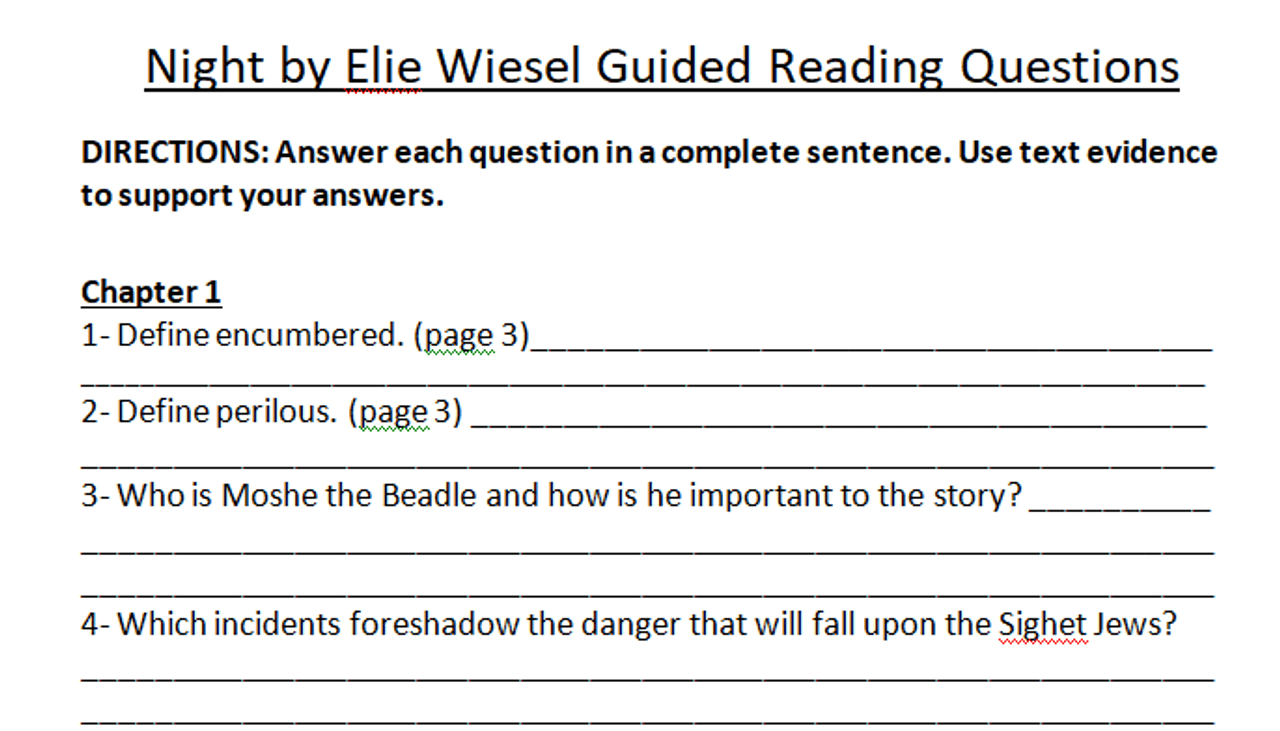Night by elie wiesel questions and answers – Night by Elie Wiesel, a haunting memoir of the Holocaust, raises profound questions about the nature of evil, the loss of faith, and the resilience of hope. This comprehensive guide delves into the novel’s intricacies, providing insightful answers to frequently asked questions.
Through a detailed analysis of symbolism, themes, characters, and literary techniques, this guide unravels the complexities of Night, offering a deeper understanding of its historical significance and enduring relevance.
Contextual Analysis
Elie Wiesel’s “Night” is a memoir that chronicles the author’s experiences as a teenager during the Holocaust. Published in 1958, the novel provides a first-hand account of the horrors and atrocities committed by the Nazis.
The novel is set in Sighet, Transylvania, in 1941, when the Nazis begin to occupy the region. Wiesel’s family, along with the rest of the Jewish community, is forced into a ghetto and eventually transported to Auschwitz-Birkenau concentration camp.
The main characters in “Night” are Elie Wiesel himself, his father, and his sister. Elie is a devout young man who struggles to maintain his faith in the face of the horrors he witnesses. His father is a respected member of the community who tries to protect his family but ultimately succumbs to the brutality of the camp.
Symbolism and Allegory
“Night” is rich in symbolism and allegory. The title itself is symbolic of the darkness and despair that Wiesel and the other victims of the Holocaust experienced.
The novel also contains many allegorical elements. For example, the train journey to Auschwitz can be seen as a journey into hell. The camp itself is a symbol of the evil and inhumanity that humans are capable of.
The characters in “Night” can also be seen as symbols. Elie himself is a symbol of the innocent victims of the Holocaust. His father represents the generation of Jews who tried to maintain their faith and culture in the face of persecution.
Themes and Motifs
“Night” explores a number of important themes, including the nature of evil, the loss of faith, and the importance of hope.
The novel shows how evil can corrupt even the most innocent of people. The Nazis are portrayed as heartless and cruel, and they show no mercy to their victims.
Wiesel also explores the theme of the loss of faith. Many of the victims of the Holocaust lost their faith in God, and Elie himself struggles to maintain his faith in the face of such evil.
Despite the darkness and despair, “Night” also shows the importance of hope. Elie and the other prisoners find hope in small acts of kindness and compassion.
Characterization and Psychology: Night By Elie Wiesel Questions And Answers

Elie Wiesel is a complex and well-developed character. He is a young man who is forced to confront the horrors of the Holocaust and to question his own faith.
Wiesel’s father is another important character in the novel. He is a respected member of the community who tries to protect his family but ultimately succumbs to the brutality of the camp.
The novel also explores the psychological effects of the Holocaust on its victims. Elie and the other prisoners are subjected to physical and psychological torture, and they are forced to witness unspeakable horrors.
Literary Devices and Techniques
“Night” is written in a simple and straightforward style. Wiesel uses short, declarative sentences to convey the horrors of the Holocaust.
The novel also uses a number of literary devices, such as imagery, metaphor, and irony. Wiesel uses imagery to create vivid and unforgettable images of the Holocaust.
Wiesel also uses metaphor to compare the Holocaust to other events in history. For example, he compares the concentration camps to the biblical hell.
Historical Significance and Legacy
“Night” is an important historical document that provides a first-hand account of the Holocaust. The novel has been translated into more than 30 languages and has been read by millions of people around the world.
The novel has also had a significant impact on literature, education, and society. “Night” has been used to teach students about the Holocaust and to promote tolerance and understanding.
The novel has also inspired other works of art, including plays, films, and operas. “Night” is a powerful and moving work of literature that continues to resonate with readers today.
Essential FAQs
What is the significance of the title “Night”?
The title “Night” symbolizes the darkness and despair that envelops the characters during the Holocaust.
How does Wiesel use symbolism to convey the horrors of the Holocaust?
Wiesel uses symbols such as darkness, fire, and the train to represent the dehumanization and suffering endured by the victims.
What is the main theme of Night?
The main theme of Night is the struggle to maintain hope and faith in the face of unimaginable evil.